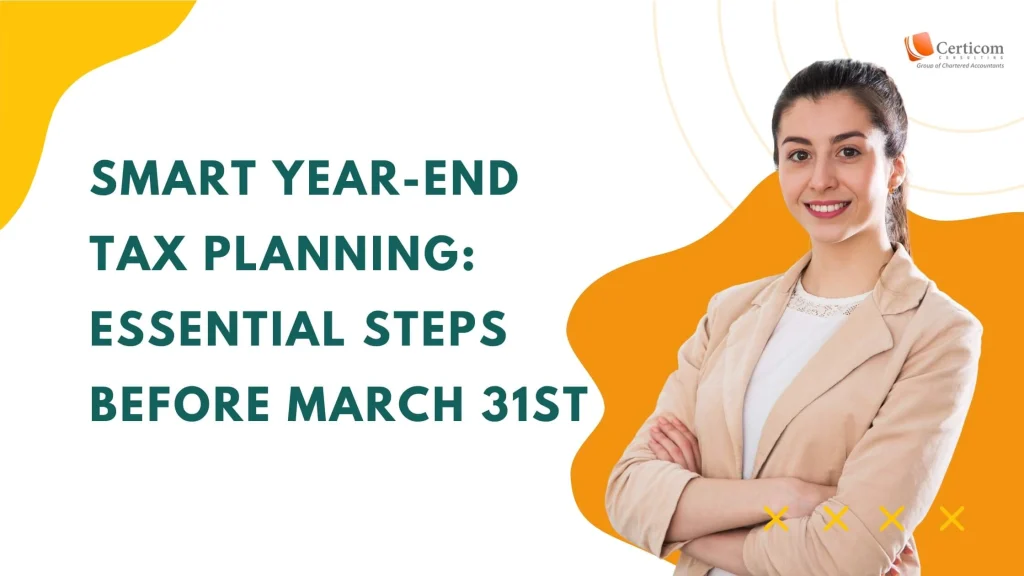Smart Year-End Tax Planning: Essential Steps Before March 31st

As the financial year draws to a close on March 31st, it is essential for taxpayers to review their finances and take necessary actions to optimize tax savings and ensure compliance. Whether following the old or new tax regime, strategic planning can minimize tax liability and prevent penalties. Here’s a structured guide to help you navigate year-end tax planning efficiently.
1. Choosing the Right Tax Regime: A Crucial Decision
Old Tax Regime: Maximizing Deductions
The old tax regime provides multiple deductions and exemptions, making it beneficial for individuals with eligible investments and expenses. Key deductions include:
-
Section 80C: Tax-saving investments like PPF, ELSS, NSC, EPF, life insurance premiums, and FDs (up to ₹1.5 lakh).
-
Section 80D: Health insurance premiums (₹25,000 for non-senior citizens, ₹50,000 for senior citizens).
-
Section 24(b): Home loan interest deduction (up to ₹2 lakh for self-occupied property).
-
Section 80CCD(1B): Additional ₹50,000 deduction for National Pension System (NPS) contributions.
-
Section 80G & 80GGC: Deductions for donations to charities and political parties.

New Tax Regime: Simplified Taxation
Introduced in Budget 2020, the new tax regime offers lower tax rates but eliminates most deductions. As of FY 2023-24, it is the default regime. Key benefits include:
Standard Deduction: ₹50,000 for salaried individuals and pensioners.
Section 87A Rebate: No tax liability for income up to ₹7 lakh.
Employer NPS Contributions: Tax-free up to 10% of salary (14% for government employees).
Focus on High-Return Investments: No deductions for ELSS, PPF, or FDs; encourages direct stock and index fund investments.
2. Financial Actions to Complete Before March 31st
For Taxpayers Under the Old Regime
Invest the full ₹1.5 lakh under Section 80C before the deadline.
Pay health insurance premiums in time to claim Section 80D benefits.
Make charitable and political donations before March 31st to claim deductions.
Submit Form 12BB to your employer with investment proofs.
For Taxpayers Under the New Regime
Declare your preferred tax regime to your employer to avoid automatic selection of the new tax regime.
Utilize the ₹50,000 standard deduction available for salaried individuals.
Optimize employer benefits like EPF, NPS, and meal allowances.
Plan capital gains efficiently as capital gains taxation remains unchange
For All Taxpayers
Review all income sources (salary, rental, freelancing, capital gains) to ensure accurate tax computation.
Verify TDS credits using Form 26AS and report discrepancies.
Pay any outstanding taxes:
Advance Tax: Ensure full payment by March 15 to avoid penalties under Sections 234B and 234C.
Self-Assessment Tax: Settle any remaining tax liability before filing returns.
Update financial documents and nominations for bank accounts, FDs, insurance, and mutual funds.
Link Aadhaar with PAN to avoid penalties and tax return processing delays.
Submit necessary declarations and proofs for deductions under the old regime.

3. Post-Year-End Tax Planning
Timely ITR Filing: File your Income Tax Return (ITR) before the due date (July 31st) to avoid penalties.
Carry Forward Losses: Ensure timely filing to carry forward capital or business losses for future tax benefits.
Track Refunds: Use the Income Tax e-Filing portal to check refund status if applicable.
A proactive approach to year-end tax planning ensures compliance and maximizes savings. By reviewing investments, reconciling TDS, and clearing outstanding tax liabilities, taxpayers can enter the new financial year with confidence. Seeking guidance from a tax professional or chartered accountant can provide further insights into making informed financial decisions.
Related Post
Faking Tax Deductions? You Could Be Penalised Up To 200% Under Income Tax Rules
Aadhaar OTP a Must for PAN Registration: New Income Tax Portal Rule
Book A One To One Consultation Now For FREE
How can we help? *




